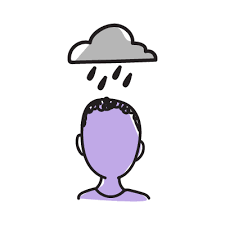What Is Depression?
The World Health Organization has stated that depression is the most significant cause of disability worldwide. Over 300 million people, worldwide are affected by the disease.
This mood illness may appear out of nowhere or follow a personal loss or defeat, which may result in persistent emotions of despair, worthlessness, hopelessness, helplessness, pessimism, or guilt. Depression also makes it difficult to concentrate, stay motivated, and perform other essential tasks.
The World Health Organization has stated that depression is the most significant cause of disability worldwide. Over 300 million people, worldwide are affected by the disease. And the illness is becoming more common across the world. A total of 15 million Americans are affected by the condition, with a growing proportion of young people.
Major depression, dysthymia, and seasonal affective disorder are all examples of depression. Bipolar disorder is also characterised by depressive episodes.
Depression is a complicated disorder which affects numerous body systems, including the immune system, either as a cause or an effect. It interferes with sleep and appetite, causing weight reduction in certain situations and contributing to weight gain in others. Anxiety is frequently associated with depression. According to research, the two illnesses not only co-occur, but their vulnerability patterns overlap.
A complete knowledge of depression has eluded researchers due to its complexity. There is emerging evidence that depression is a natural bodily defence mechanism, a kind of shutdown or immobilisation in response to danger or defeat, that is supposed to conserve energy and help you survive.
Researchers have found some evidence that depression susceptibility is linked to food, both directly (due to insufficient intake of nutrients like omega-3 fats) and indirectly (due to the diversity of bacteria in the gut). However, depression affects both individuals who suffer from it and those who care about them, as it affects their emotions and thoughts and bodies. It creates agony for those who suffer from it and those who care about them. Children’s depression is becoming more common.
Depression is very treatable, even in the most severe cases. Because the disorder is frequently cyclical, early therapy may help avoid or delay recurrence. Many studies demonstrate that cognitive behavioural therapy, which targets unhelpful thought processes, is the most effective treatment, with or without the use of antidepressant medicines. Moreover, evidence is rapidly growing that regular mindfulness meditation, either alone or in combination with cognitive therapy, can prevent depression before it begins by reducing reactivity to distressing experiences, effectively allowing attention to be disengaged from the repetitive negative thoughts that frequently set the mood spiral in motion.
What Are the Signs of Depression?
Not everyone who is depressed exhibits all the signs and symptoms. Some people have a few symptoms, while others have a lot. Symptom severity may vary from one person to another and with time.
A persistent gloomy, anxious, or empty attitude; feelings of hopelessness or pessimism; and feelings of guilt, worthlessness, or helplessness are all common symptoms of depression. It could also include a loss of interest or pleasure in previously cherished hobbies, and activities, such as sex. Restlessness, impatience, and difficulties concentrating, remembering, or making decisions are also prevalent, as are decreased energy, weariness, or a sense of being “slowed down.” Many people who are depressed experience suicidal or death thoughts.
Sleep (insomnia, early morning rising, or oversleeping) and eating habits may be disrupted in those who are depressed (appetite changes such as weight loss or gain). Stomach problems, headaches, and chronic pain are examples of persistent physical symptoms.
What Causes Depression?
A variety of factors cause depression. Rather, a mix of genetic, physiological, environmental, and psychological factors are most likely to blame. A depressive episode can be triggered by significant unpleasant experiences such as trauma, losing someone close, a challenging relationship, or any other stressful scenario that could overwhelm one’s ability to cope. Depressive episodes may follow, either with or without an obvious trigger.
On the other hand, negative life situations do not always lead to depression. According to research, excessive rumination and negative thought patterns, especially about oneself, are only put in motion when such events occur.
According to research, the brains of people who have depression look different from those who do not, using brain-imaging technology such as magnetic resonance imaging (MRI). The regions of the brain that control emotion, thinking, sleep, food, and behaviour, in particular, appear to be malfunctioning. It’s unclear which changes in the brain are the cause and which are the result of depression.
Some types of depression run in families, implying that there may be a genetic component to the condition.
How Is Depression Treated?
Even the most severe symptoms of depression are often treatable. As with many other illnesses, the earlier treatment begins, the more effective it will be, and the less likely a recurrence will occur.
An assessment by a physician is the first step in getting the correct treatment for depression. Certain drugs and other medical illnesses, including viral infections or thyroid problems, can mimic depressive symptoms and should be ruled out. The doctor should inquire about the patient’s alcohol and drug usage and any thoughts of death or suicide.
Depression can be treated in various ways once it has been diagnosed. Medication and psychotherapy are the most popular therapies. Many studies suggest that cognitive behavioural psychotherapy, either alone or in combination with medication, is highly successful.
Psychotherapy works with the thought patterns that lead to depression, and studies demonstrate that it reduces the likelihood of recurrence. Drug therapy can help people with symptoms like severe anxiety so they can participate in effective psychotherapy.
Natural Approaches to Treating Depression
Depression necessitates active treatment since it can have long-term effects on brain function, making recurrence more likely. A future episode of depression is more likely the longer a depression episode lasts.
However, there are a variety of techniques to treat depression, and some of the most effective, particularly in cases of mild to moderate depression, do not involve a prescription or any form of medical intervention.
Depression can be compared to a deep hole, and getting out of it requires some time and work. However, it is typically feasible by learning new ways of thinking and acting. Nutrition also has a role.
Depression and Your Health
Emotional pain has a negative impact on your health: A cardiac incident is three times more likely in people who suffer from depression. Depression affects the entire body by lowering the immune system, making people more susceptible to viral infections and, in the long run, cancer—a compelling justification for early treatment. It also disrupts sleep, contributing to feelings of drowsiness, exacerbating problems with attention and concentration, and putting one’s health at risk.
Depression has also been linked to an increased risk of diabetes and osteoporosis in those who suffer from it. Dysthymia, a disorder characterised by years of low energy, low self-esteem, and little ability to experience pleasure, is a form of depression that can present as a prolonged low mood.
Living with Depression
Everyone can have a bad day, now and again. Clinical depression, on the other hand, can be a more pervasive sense of unpleasant ruminating, a grim perspective, and a lack of energy. It’s not an indication of personal weakness, nor is it a condition that can be wished away. People suffering from depression are unable to simply “get themselves together” to recover.
It doesn’t help that modern life is becoming increasingly stressful. There is a cultural trend away from direct social interaction favouring technological connection and a focus on material prosperity at the expense of rich experiences and social touch, emphasising early childhood achievement at the expense of free play. Everyone has a role to perform.
However, as unpleasant as depression is, there is some evidence that it may serve a beneficial purpose by forcing those who suffer from it to focus on problems as a preliminary to overcoming them. Depression, according to some psychologists, might help a person achieve much-needed self-awareness.
The Major Forms of Depression
When most people talk of depression, they’re referring to unipolar depression, which is defined as a persistent condition of melancholy, apathy, hopelessness, and exhaustion. Major depression is another name for it.
Bipolar disorder, characterised by depression interspersed with moments of high-energy mania, also has depressive episodes. People swing ober and back between the two poles of mood states, sometimes in a matter of days and sometimes in a matter of years, with intervals of stability in between.
The so-called baby blues are a set of mood swings or crying spells that can occur in the days or weeks following a baby’s delivery. Postpartum depression is a disorder that requires treatment, particularly since it can interfere with a parent’s ability to care for their child when the reaction is more severe and extended.
Depression can also be seasonal, especially during the winter months when sunlight is scarce. Seasonal Affective Disorder (SAD) is a condition that can be helped by daily exposure to certain types of artificial light.
The Biology of Depression
Depression wreaks havoc on an individual’s biology, causing a slew of symptoms ranging from sleep disturbances to the inability to perceive pleasure, as well as a lack of drive and guilt. The biology of depression is a prominent issue of continuing research because of its complexity and the fact that it contributes so much to human suffering.
Overactivity of the stress response system, changes in the activity of various neurochemicals in the brain, decreased efficiency of nerve circuitry and nerve generation, disruptions in energy use in nerve cells, inflammatory substances in the brain, disturbances in the 24-hour (circadian) clock all play a role in the onset or progression of depression, influencing the type and severity of symptoms.
Depression and Suicide
The majority of suicides are linked to a psychiatric disorder, primarily depression, and the severity of depression increases the risk. Even so, most people who suffer from major depression do not commit suicide.
According to studies, about 5% of depressed people have suicidal thoughts (suicidal ideation). Only a small fraction of them deliberately plan to commit suicide.
Talking about wanting to die is the most obvious indicator of suicidal ideation. And the best way to find out if suicide is a possibility is to ask.







